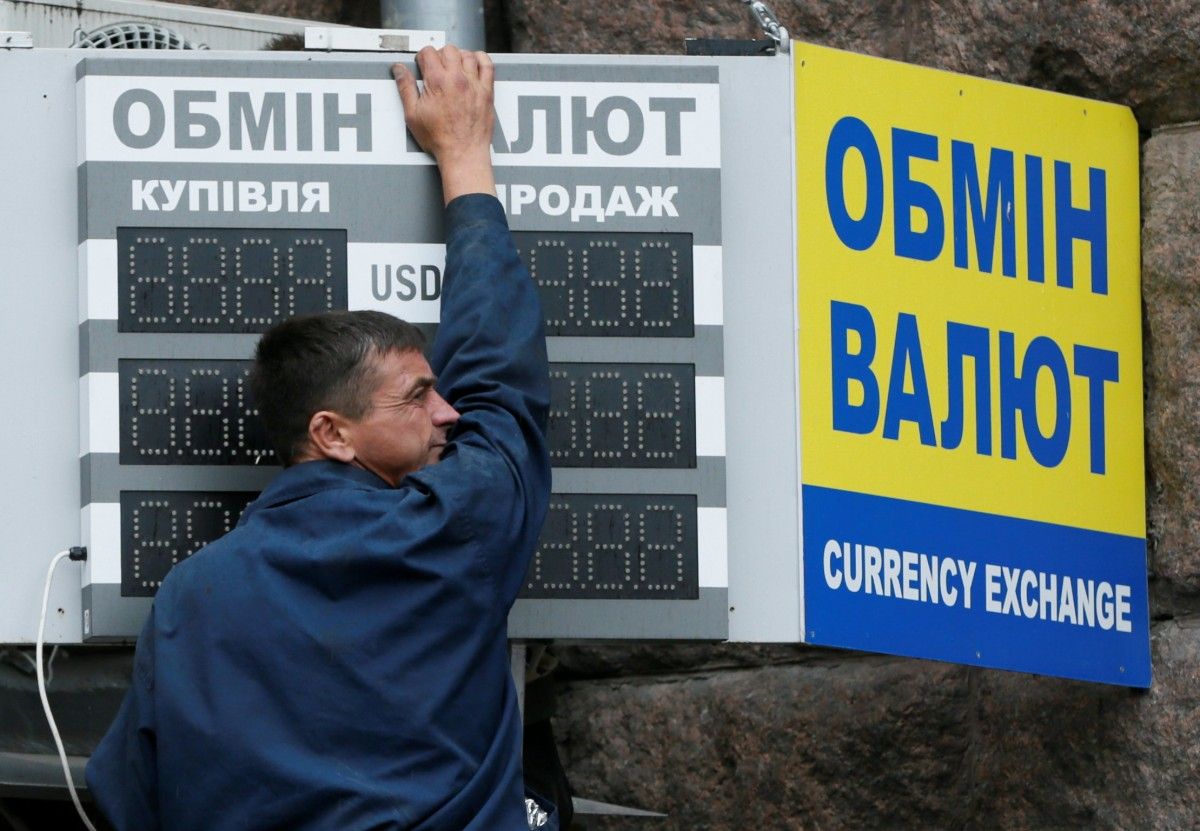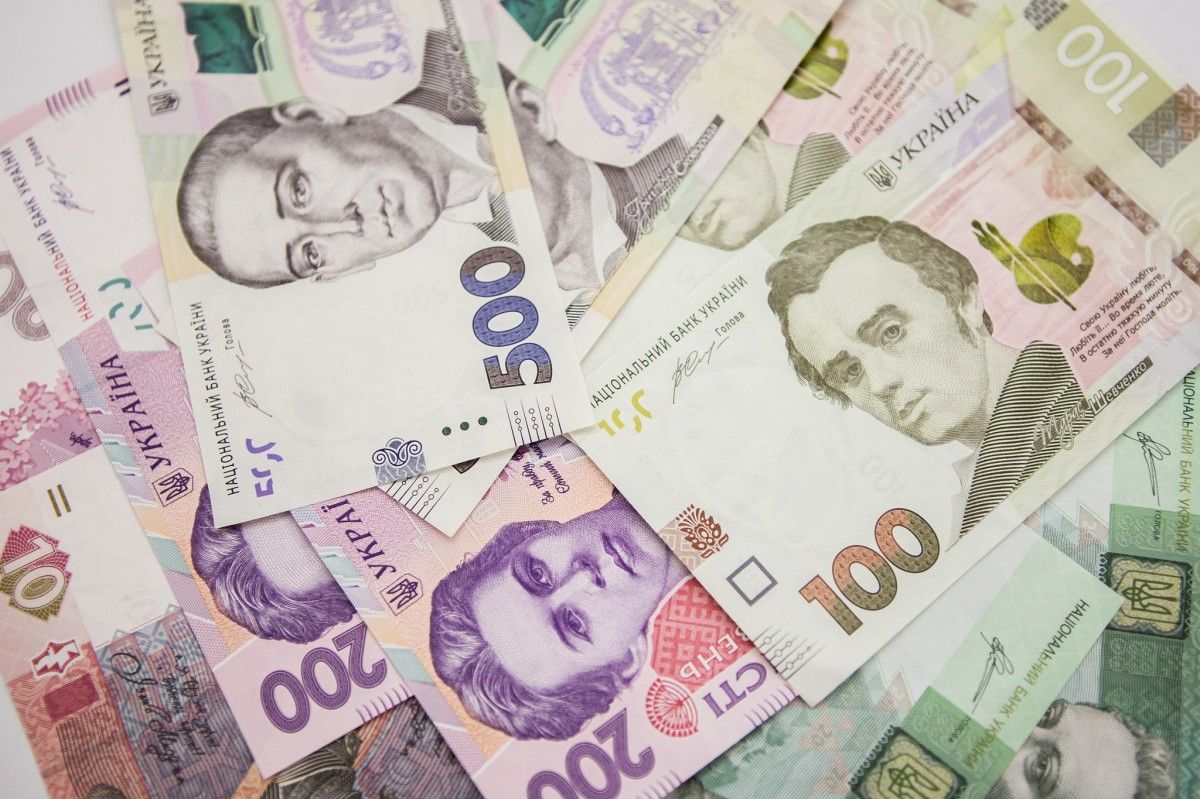
Elections, IMF: What to expect from Ukrainian hryvnia
The Ukrainian hryvnia responded to the completion of the presidential election by slightly sliding down. But there is one more political battle ahead – parliamentary elections. In addition, due to a number of reasons, continued cooperation with the main creditor - the International Monetary Fund – could become an issue. UNIAN figured out what to expect from the national currency this year.
The presidential elections in Ukraine is completing with a rise in foreign currency. On April 22, the hryvnia to dollar quotations at the opening of the interbank market were set at UAH26.81 - 26.85/USD. The euro rose to UAH30.12-30.15. In the cash market, the national currency quotes to the dollar amounted to UAH 26.86 -27.16. Euro is bought for UAH 30.13 and sold for UAH 30.61. In the “black” market, “green bucks” are traded at UAH 27.02-27.12, and the euro – at UAH 30.38-30.47. The fall of the national currency is still insignificant - around 6-7 kopiykas. But it's still out there, and the trend is negative. The National Bank has previously warned that it is almost impossible to predict the situation on the foreign exchange market after the presidential elections. At the same time, from the beginning of the year, the hryvnia has strengthened by 3.2%.
While the hryvnia's historical minimum of February 2015 (UAH 30.01/USD) is still far off. The 2019 state budget is based on a forecast rate of UAH 29.4/USD. A more positive assessment was given by the main creditor, the International Monetary Fund. The Fund believes that this year the hryvnia will devalue to UAH 28.68 /USD from UAH 27.19/USD in 2018.
Approximately the same parameters are set in the forecast by S&P – by the end of the year, the hryvnia will fall to UAH 28.6 to the dollar. And the main reason is the slow GDP growth. S&P emphasizes that GDP per capita in Ukraine is the third lowest among the countries of Europe and the CIS – after Tajikistan and Uzbekistan. According to S&P, to accelerate growth, our country will need more investments, which last year amounted to only 19% of GDP, with a pre-crisis figure in 2007 being at 30%. Another factor holding back economic growth is weak lending to the banking sector. Thus, according to S&P, from 2014 to 2018, real growth in private sector lending declined by almost 65%.
Businesses believe that the hryvnia exchange rate will not exceed the level of UAH 29/USD this year, while the average value will be at UAH 29.32.
Experts also assure that the threat of the hryvnia falling in the near future is off the table, but in the medium term it can actually slide. And it's issues with further cooperation with the IMF that is to blame. The IMF mission was working in Kyiv from March 5 to March 13 before leaving without any comments. The National Bank explained this by the fact that the visit was technical, it did not provide for making a decision on granting or delaying the next tranche. Two of them are expected this year, $1.3 billion each, in May and November. Tranches will be allocated based on the review of compliance with the conditions of the new 14-month stand-by program in the amount of $3.9 billion, which was approved by the IMF in December 2018. In the same month, Ukraine received the first tranche of $1.4 billion. The fate of the next loan will traditionally be decided by the IMF mission. it is scheduled to arrive in our country on May 15 and November 15.
To receive loan assistance, it is necessary to fulfill the main conditions of the IMF – to raise gas prices for the households, which is provided for in the budget for the current year since May, to launch large-scale privatization, which has been failing for five years already, to adopt the “split” law, which implies optimization of state regulation of non-banking financial services markets , to reform the fiscal service – to separate tax and customs services – and to intensify the fight against corruption. None of the above has been done. But weird “anti-corruption” innovations have been introduced – the decision of the Constitutional Court abolished criminal liability for illegal enrichment. This rule was introduced in 2015 during the implementation of the previous cooperation program with the Fund. The verdict of the CCU has already provoked a strong reaction from international partners. In addition, the lenders were also dissatisfied with the court ruling on the unlawful nationalization of PrivatBank.
And if donor assistance does not come this year when it's needed more than ever (in 2019-2020 Ukraine’s needs in external financing will be very high, since the servicing of foreign debt alone is at $4.3 billion this year, and repayment – at $1.7 billion, plus approximately $2.4 billion in 2020-2021), it will be very difficult to find a way out of this. Of course, the hryvnia will be the first one to respond to problems.
What to expect from hryvnia
According to head of the expert-analytical Council of the Ukrainian Analytical Center, Borys Kushniruk, the risks for the hryvnia exchange rate are very substantial.
"The main thing is that I am absolutely sure Ukraine will not receive the IMF tranche this year. And perhaps next year we will not be able to resume cooperation with the Fund. In order to receive the tranche, Ukraine, first of all, had to adopt the 'split' law – on the separation of the National Financial Services functions between the National Bank and the National Commission on Securities and Stock Market. Adopting the law until May, when the Fund's working mission is set to arrive, is impossible. In addition, the IMF rather harshly responded to the court rulings on PrivatBank. And it was the International Monetary Fund that initiated the nationalization of this bank. That is, in May we will not receive the tranche, and then the parliamentary campaign will be in full swing, the IMF will wait for its completion, and then we will wait for the adoption of the 2020 budget. Thus, until the spring of next year, the IMF will not give any money. And accordingly, there will be no help from the World Bank, the EU, and the U.S. Given all these factors, which can be discussed with 100% probability, there will be problems with the hryvnia exchange rate. To repay the debt this year there are reserves, but in the future this will be very difficult to accomplish. By the end of the year, there will be too much pressure on the hryvnia. Negative expectations are out there, in addition to the negative factors of the balance of payments. Plus, the intensification of the political struggle on the eve of parliamentary elections…" said the expert.

Dragon Capital's expert Serhiy Fursa also believes that in the medium term, the drop of the national currency cannot be ruled out: “In the near future, nothing should threaten the hryvnia exchange rate. At the same time, in the medium term, the rate of the national currency depends on whether cooperation with the IMF continues. And the risk of losing it remains. This both about the developments around PrivatBank, the split law, and the NBU audit.
Head of the Council of the National Bank, Bohdan Danylyshyn, is more optimistic. He emphasizes that Ukraine’s economy has been growing for 12 consecutive quarters. Ukraine's GDP grew by 3.3%. Nominal GDP amounted to UAH 3.56 trillion, and UAH 84,190 per capita. Nominal GDP in dollar equivalent amounted to $130.83 billion. The main driver of real GDP growth in 2018 was domestic demand, both consumer and investment-related. Investment activity was a significant factor in economic growth. Last year, gross fixed capital formation increased by 14.3% in annual terms, in particular, due to the business need for modernization of production and renewal of fixed assets. "These factors will remain the main engines of economic growth in the current year. The Cabinet of Ministers predicts Ukraine’s GDP growth by 3% in 2019, and the National Bank says it will be 2.5%. Rather optimistic about the development of the economy are the key partners of our country from among the international financial institutions. In particular, the World Bank predicts the growth of the Ukrainian economy by 2.9% this year, and the International Monetary Fund says it will be 2.7%. Following the 1st quarter of 2019, we can expect up to 2% of GDP growth, given that the index of production of basic industries in the first two months fell by 0.5 percentage points. Standard & Poor's Global Ratings has confirmed the long-term and short-term sovereign credit ratings of Ukraine for foreign and national currency bonds at “B/B” level with a stable outlook. The banking system of Ukraine completed 2018 with a profit of UAH 21.7 billion. And this followed the years of 2014-2017 which brought no profit to the banking system. The positive financial result of banks in 2018 is a historical maximum in terms of amount. The situation on the currency market of Ukraine remains stable. Since January 1, the hryvnia has strengthened against the dollar by more than 3%. As of April 1, 2019, the international reserves of Ukraine amount to $20.6 billion. The volume of international reserves covers 3.4 months of future imports, which is sufficient to meet the obligations of Ukraine and the current operations of the government and the National Bank. The favorable situation in the foreign exchange market enabled the NBU to purchase on the market about $700 million for its reserves. Moreover, the NBU is closely monitoring the situation in the interbank foreign exchange market and is ready to smooth exchange rate fluctuations in a timely manner," the expert concluded.
As for the case of PrivatBank, he believes, there will come an appeal, whose consideration could take several years. Therefore, the situation around the bank will remain stable.
"It is important for us not only to ensure the stability of the system, but also not to lose the trust of our creditors, with whom we have achieved financial stability. I am sure that the coordinated actions by the NBU, the government, and the National Security and Defense Council will save Ukraine from unnecessary losses and financial turmoil," the expert concluded.
Elections only mark the start of change. There is hope that they will only be for the better.
Nana Chornaya

